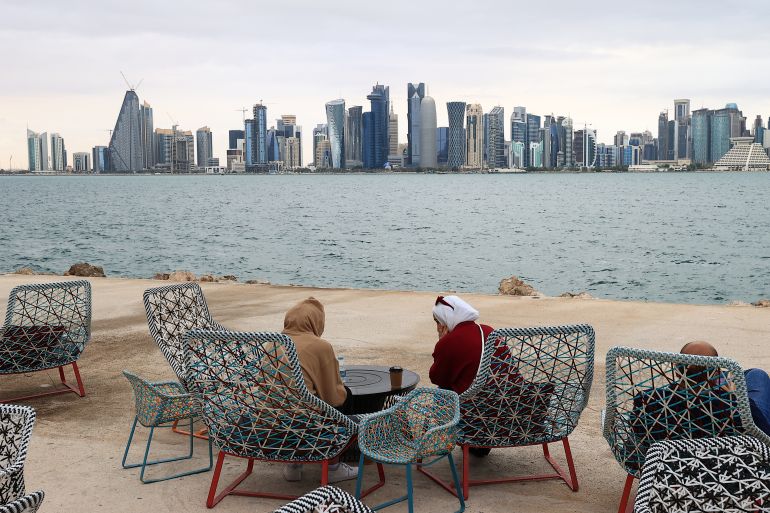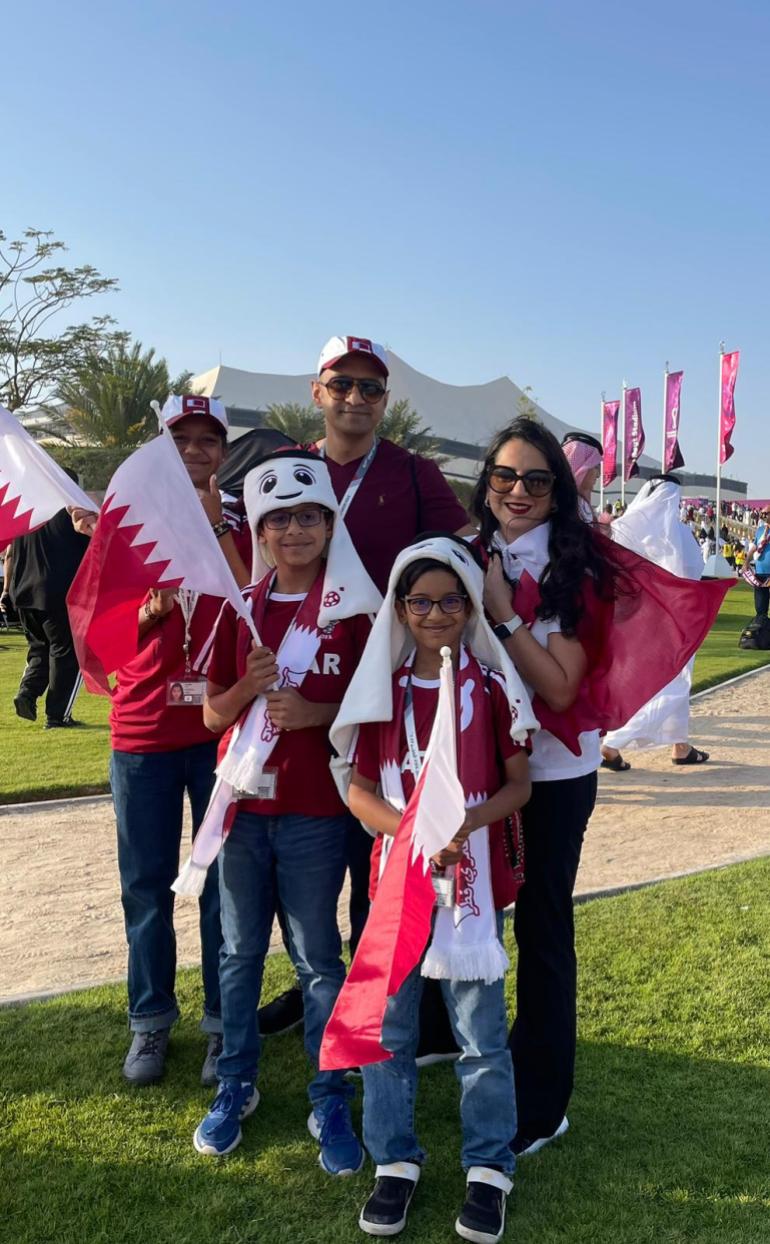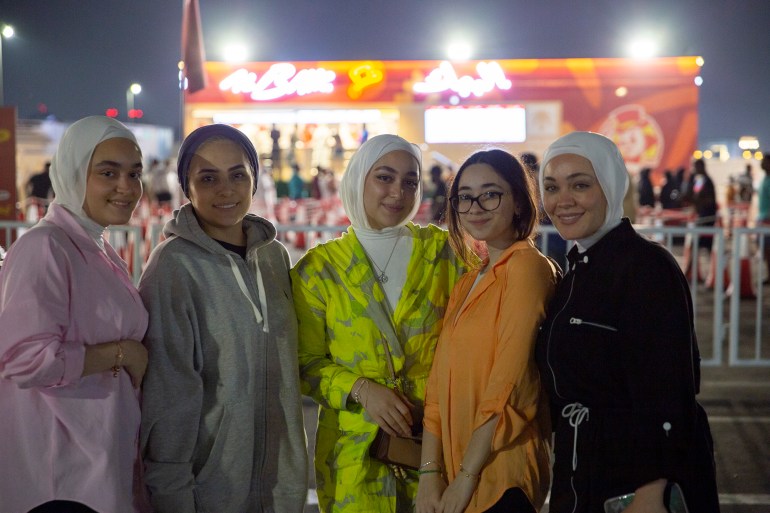When they came, a Qatar World Cup was unthinkable. Now it’s here
How Qatar has changed, seen through the eyes of the expats living there since before it won the right to host the World Cup.

Doha, Qatar – Shehar Bano Rizvi moved from the bubbling, ever-expanding metropolis of Karachi to a calmer Doha soon after her marriage in 2004.
The then-23-year-old Pakistani expat was not impressed when she arrived in the Qatari capital, thinking she had landed in the middle of a desert in more ways than one. The streets were empty and the shopping options scarce. A solitary five-star hotel, a basic mall and a smattering of office buildings stood in West Bay.
Keep reading
list of 4 itemsCristiano Ronaldo scores winner in record 200th game for Portugal
Kylian Mbappe informs PSG he will not extend contract: Media
Qatar World Cup: Watchdog says FIFA’s carbon-neutral claims false
“My husband had a very basic driving rule for me: if you get lost, follow the directions to the Corniche [waterfront promenade] and you will be able to navigate your way home,” Rizvi said, recalling her first experiences getting around Doha at a time when apps were unheard of.
Fast-forward 18 years and West Bay is buzzing. It is Doha’s prime business district and home to an ever-busier skyline populated by more and more skyscrapers. Shiny new buildings along the shores of the Gulf bask in the sun all day and put on a glittering light show at night.
Doha’s metamorphosis extends beyond here though, with new districts, cultural hubs and state-of-the-art venues having transformed the cityscape.
Human rights organisations and media reports have said Qatar’s development has come at the cost of labour rights. Concerns about low wages, poor living conditions and worker safety have been consistently raised by rights groups and critics of the Gulf nation hosting the World Cup.
Hitting back, Qatari officials point to recent reforms to labour laws, including a universal minimum wage and an easing of restrictions on foreign workers who want to change employers. Officials have also criticised Western media for what they call biased and inaccurate coverage of Qatar and its preparations for the tournament.
Qatar, an energy-rich country that declared independence only five decades ago, won the right to host the World Cup in 2010. Its transformation has also coincided with a rapid increase in its population – currently, nearly three million people – the vast majority of whom are migrant workers, mostly from South Asian countries.
“Qatar’s independence was in 1971, so we ha[d] certain policies that do not fit now,” Faisal al-Mudakha, editor-in-chief of the Gulf Times, told Al Jazeera.
“Now we have the World Cup,” he said. “We are talking about 12 years of reform of policy … [that is being] done because of the World Cup – but it [has been] fast-forwarded. And I think after the World Cup, it will also continue based on needs and to meet international law.”
Focus on sport
Six-lane highways, a sparkly-clean metro train system and commuter buses that now form Qatar’s transport hub were a distant dream in the early 2000s, when the thought of a tiny country like Qatar hosting a football World Cup was beyond imagining.

“I remember attending the opening ceremony of the 2006 Asian Games in disbelief that a country of Qatar’s size could host such a big event,” said Rizvi, a photographer and an author of a book on Pakistani cuisine.
“On that cold, rainy December night at the brand new Khalifa International Stadium, it became clear that Qatar was shifting its focus towards sports, culture and education.”
The country formalised that change in the following years under its National Vision 2030, an ambitious development plan aimed at diversifying its economy, slashing its carbon footprint and achieving social progress.
Sports are a key pillar of that vision. Since 2012, Qatar has celebrated an annual sports day every February. The occasion is marked as a public holiday, allowing residents to participate in sports and fitness-related activities.
Back then, according to Rizvi, the number of women and girls in sports was negligible.
“My daughter took up football as a child but left it after a while because there were no all-girls teams,” she said. “But now, as a teenager, she plays in an academy that has brought her international exposure and given her a chance to meet her football idols.
“And it’s not just her, so many Qatari female teenagers turn up to practice sessions and games with their fathers, who seem genuinely proud and can be seen cheering them on from the sidelines.”
However, there has been lackadaisical progress in women’s football on the bigger stage. The Qatari women’s football team has not played a competitive match in a few years and has dropped out from FIFA’s rankings, while many teenagers and young women stop playing as they get older.
‘It wasn’t just about Qatar’
Despite the gradual growth on the football pitch, women have been at the forefront of educational and cultural progress in the country.
Sheikha Moza bint Nasser, the second wife of former Emir Sheikh Hamad bin Khalifa Al Thani, was pivotal in establishing Qatar’s Education City in 2003, where several renowned international universities have set up local campuses.
Sheikha Mayassa bint Hamad, the current emir’s sister, heads the arts and culture scene in the form of the Qatar Museums Authority (QMA).
The organisation has established several museums across the country that focus on Arab and Islamic art, Qatar’s national history, sports and an interactive children’s museum which is set to open soon.

The cultural centres have become a popular leisure option for many who, for years, had few entertainment alternatives.
“It was very basic,” Eeman Abed, a Palestinian who has been living in Qatar for more than 20 years, said. “Go to the park, have a walk at the Corniche or eat out at the weekend,” she added with a shrug.
But as the country moved forward and Doha grew to a thriving hub of arts and culture, Abed added, it took many of its expats along.
“We used to live in a small house in old Doha and after moving across the city over time, we have now settled in The Pearl,” she said, referring to the upmarket artificial island with Mediterranean-inspired housing and beaches.
That’s where Rizvi lived with her husband, who works for Qatar Stock Exchange, when the country won World Cup hosting rights.
Rizvi remembers a festive night as people came out with their maroon and white Qatari flags and national songs thundered out of cars.
“It wasn’t just about Qatar,” she says. “It was about an Arab Muslim nation hosting the world’s biggest event and that is exactly what the West is unable to fathom,” she adds, referring to the ongoing criticism that Qatar has faced since that night in December 2010.
But with the event now under way, every part of Doha’s tourist hotspots has been filled up by international fans – from the West and beyond. They are trying on local food and fashion, indulging in banter with local fans, and bringing their festivities to the Gulf shores.
